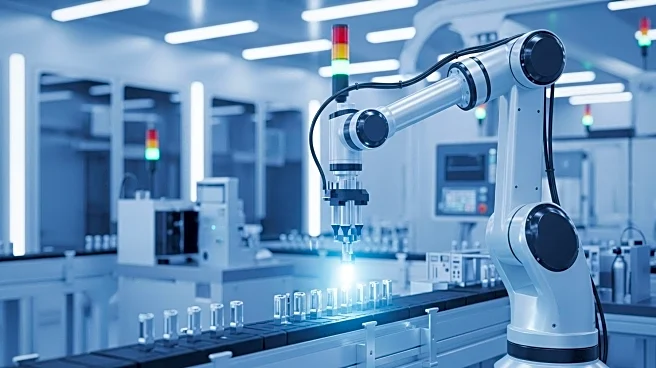What is the story about?
What's Happening?
The pharmaceutical industry is increasingly adopting artificial intelligence (AI) to address challenges in manufacturing processes. A new white paper titled 'Future Proof Production: Implementing AI in Pharmaceutical Manufacturing' by Zühlke and the University of St. Gallen highlights the transformative potential of AI in this sector. The paper outlines how AI can improve production flexibility, quality control, and supply chain resilience, which are currently hindered by manual processes and regulatory complexities. The document provides a framework for developing and validating AI in GxP-regulated environments, supported by case studies from leading pharmaceutical companies.
Why It's Important?
The integration of AI in pharmaceutical manufacturing is crucial for enhancing efficiency and competitiveness. As the industry faces global disruptions and regulatory challenges, AI offers solutions for optimizing resources and improving quality assurance. This shift is not only an opportunity for improvement but a necessity for maintaining a competitive edge. The adoption of AI can lead to more reliable and robust manufacturing processes, benefiting companies by reducing costs and increasing productivity. Stakeholders in the pharmaceutical industry, including manufacturers and regulators, stand to gain from these advancements.
What's Next?
Zühlke plans to host a panel discussion at the World Health Summit in Berlin, focusing on the resilience of pharmaceutical manufacturing amid geopolitical instability and technological change. This event will bring together global health and industry experts to explore further applications of AI in the sector. The ongoing dialogue and collaboration among industry leaders are expected to drive the implementation of AI solutions, paving the way for future innovations in pharmaceutical manufacturing.
Beyond the Headlines
The adoption of AI in pharmaceutical manufacturing raises ethical and regulatory considerations. Ensuring compliance with existing regulations while integrating new technologies is a complex task that requires careful planning and execution. Additionally, the shift towards AI-driven processes may impact workforce dynamics, necessitating retraining and adaptation to new roles. Long-term, AI could revolutionize the industry, leading to more sustainable and efficient practices.















